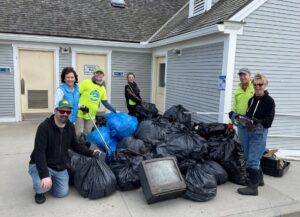 HYANNIS – April is Testicular Cancer Awareness Month, an important time to raise a sensitive issue that more men and those who love them should be aware of and paying attention to. Testicular cancer is a relatively rare cancer accounting for about 1 percent of all male cancers, yet it is the most common form of cancer diagnosed in men aged 15-35. Approximately 8,850 new cases occurred in 2017, and testicular cancer was responsible for slightly more than one death a day in the United States.
HYANNIS – April is Testicular Cancer Awareness Month, an important time to raise a sensitive issue that more men and those who love them should be aware of and paying attention to. Testicular cancer is a relatively rare cancer accounting for about 1 percent of all male cancers, yet it is the most common form of cancer diagnosed in men aged 15-35. Approximately 8,850 new cases occurred in 2017, and testicular cancer was responsible for slightly more than one death a day in the United States.
The good news is that generally the prognosis for those diagnosed is excellent, with an overall 5-year survival rate of 95 percent. It’s also important to remember that there are many abnormalities that may be found that are benign; some requiring treatment, some only requiring treatment if symptomatic. So if an abnormality is found or suspected, the most important next step is a visit to your physician.
There are no blood tests that are useful for screening for testicular cancer. However, there are some known risk factors that increase the risks of testicular cancer, including history of undescended testis, cancer of the other testicle, wasting (atrophy) of the testicle, family history of testicular cancer and some birth abnormalities of the genitourinary system. Testicular cancer also occurs more commonly among white males than other races.
While there may be other factors thought (but not proven) to increase risk, it is important to note that vasectomy has not been shown to increase risk.
Testicular cancer can generally be identified while still at an early stage with common first symptoms being either a discrete lump or swelling. Although there is no evidence-based support that regular self-exams reduce death rates of this cancer, many physicians do recommend that men perform monthly testicular exams to help identify any change. The American Cancer Society site has a good description to help guide self-exam at https://www.cancer.org/cancer/testicular-cancer/detection-diagnosis-staging/detection.html
The common presenting symptoms for testicular cancer may include:
Painful or non-painful mass in the testicle or scrotum
Firmness in the testicle
Fullness or heaviness in the scrotum
Dull ache in the lower back, groin or abdomen.
Removal of the testicle with the tumor (orchiectomy) is usually the first step and, if there has been no spread of the cancer, may be the only treatment necessary. If the cancer has spread, further surgery to remove lymph nodes may be recommended. Depending upon the stage of the cancer and exact type, radiation therapy and/or chemotherapy may be recommended also.
The important thing to bear in mind if you or a loved one is facing this rare cancer is that even for those who have distant spread of disease, the 5-year survival rate is still surprisingly good at approximately 73 percent. Please help raise awareness of this very treatable cancer during the month of April.
By DONALD A. GUADAGNOLI, MD, Cape Cod Health News























